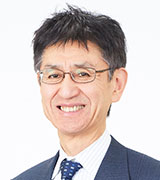Our Program
NAKATA Yoshifumi
Profile

Director, Data science, Kyoto Women's University
- 1986 - 1987
- Assistant Professor, Department of Economic & Legal Studies, University of Alabama
- 1987
- Ph.D. in Economics, University of California, Berkeley
- 1988 -
- full-time lecturer、Assistant Professor、Professor, Doshisha University
- 2002 - 2004
- Dean, Management School, Doshisha University (Year 2004 Renamed to: Business School)
- 2003 - 2008
- The 21st Century COE 'Comprehensive research on technology, companies, and international competitiveness' Program Leader
- 2007 - 2016
- Director -GeneralDean, Institute for Technology, Enterprise and Competitiveness, Doshisha University
- 2009 -
- Executive Director, The Japan Society for Business Succession (President until 2013)
- 2012 - 2021
- Director Administrator, Institute of International Industrial Relations
- 2018 - 2024
- Director Dean, Research Institute for STEM Human Resources Doshisha University
- 2025 -
- Director, Data science, Kyoto Women's University
Expectations for the Program
I have been studying the research and innovation(R&D) activities of researchers and engineers since 2006. My research question is: What factors influence the performance of their R&D activities? In addition to individual’s abilities and motivation, our research indicates that it is important to match their interests and abilities with the work that they will be doing (the specific content of R&D). We also ask if the workplace provides an environment that they can maximize their full potential? In other words, our question is what kind of work environment helps them reach their full potential.
work environment is provided by the organization, e.g., the company's management strategy and its implementation as well as the various corporate systems such as the reward system for inventions and other achievements, flexible and discretionary work systems that allow employees to freely choose their working hours, and the mid-career and year-round recruitment systems.
And these factors that define the creative activities of R&D personnel are further conditions by various policies and systems at the national level.
Unfortunately, innovation/science and technology (S&T) policy to this day has not made explicit the relationship between the microenvironment of the individual and the larger macro policy and system, and not paid much attention on the effects of them. In this program, I expect to see many proposals for research that will connect this missing link.
Related Links
The report compares the relationship between the way software engineers contribute to the creation of new social value using various software technologies and, their perceptions of job satisfaction among five countries, i.e. Japan, the United States, China, Germany, and France. The report contains a variety of findings that will be useful not only for the software engineers involved, but also for the companies that employ them and the policy makers involved in ICT policy.
"A Study of the software engineer Productivity and the effects of improved Treatment of Software Engineers in Japan: Using a Framework of International Comparative Analysis with Asian, Western Countries" in 2016 Information-technology Promotion Agency, Japan




